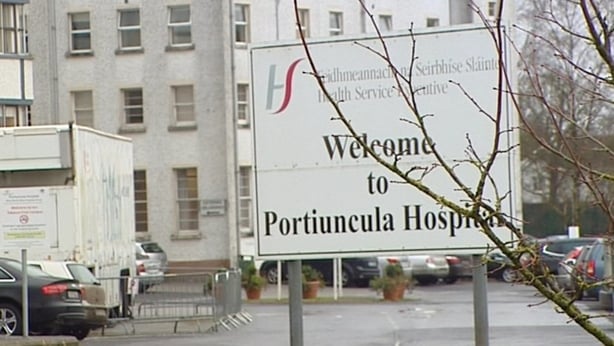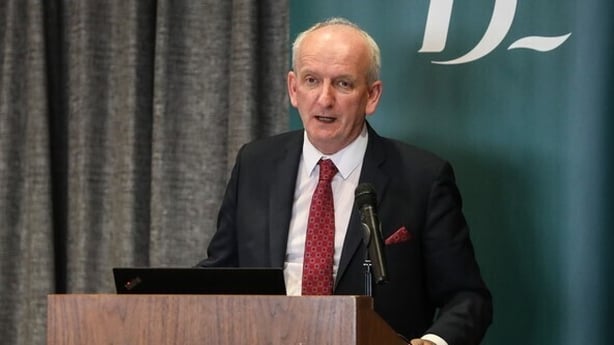Portiuncula University Hospital in Ballinasloe, Co Galway is again in the spotlight over maternity services and the care of babies.
It is not a new issue for the hospital's maternity unit, which has come under scrutiny now on three separate occasions regarding the delivery of babies.
There was a review published in 2018 (the Walker Report covering 18 cases), another review covering eight cases between 2019-2023 and now the ongoing review of nine cases.
This means that there have been around 35 cases that have needed investigation, the first going back to around 2008.
Not all cases relate to the issue of shortage of supply of oxygen to a baby’s brain.

A time of anxiety
Given the serious developments, now will be a time of great anxiety for the women and families affected and also for hundreds of women who are due to give birth at Portiuncula over the next year.
A management team, led by an external consultant obstetrician Dr Mark Skehan, is now in Portiuncula to oversee and lead maternity services. The team includes a director of midwifery and a senior manager.
The HSE has moved to reassure women going to the hospital to have their children that it is safe.
The HSE West and North West Regional Executive Officer Tony Canavan said the events have caused additional anxiety for people that are hoping to have their babies in Portiuncula.
"But I would say that the hospital is safe, it’s continuing to provide services as normal", he told RTÉ News this week.
However, these circumstances are anything but normal.
The latest review of nine cases involves two still births in 2023, six babies born last year and one case this year.
Brain cooling treatment
Many of the babies had hypoxic ischaemic encephalopathy (HIE). It causes reduced supply of oxygen to a baby’s brain, before during or even after birth.
The standard treatment is 'Therapeutic Hypothermia’ - cooling a baby quickly after birth for several days.
This treatment usually involves a baby being cooled within six hours of being born, to a core body temperature of between 33-34 C, for 72 hours.
After that time, the baby is rewarmed to normal body temperature over six-12 hours.
This treatment, often called ‘head cooling’, slows the brain’s metabolism and can prevent further damage. The sooner the cooling begins, the better the outcome for the baby.
What has sparked concern with Portiuncula is that since 2024, seven babies had HIE resulting in six being referred for therapeutic hypothermia.
The HSE has said that in the other case, the baby should probably have been referred for this treatment also.

High incidence
The HSE said the incidence of cases at the hospital last year was significantly higher when compared with national or even international data.
Many of the reviews have been underway for some time and the hope is that most will be completed by the end of next month.
The reviews will likely become available sequentially, depending on when the incident occurred.
When the reviews are completed, the findings will be shared with each family. The HSE said it is also providing support to the families affected.
It is unclear how much of these reviews might be made public.
HSE chief Bernard Gloster said that the reviews will contain a significant amount of personal details.
He said that non-personal information particularly for the purpose of either learning or any type of transparency and accountability can be published and the HSE’s instinctive position is to absolutely publish what is available.
Mr Gloster also acknowledged that there is no question that three interventions and three periods of review over a 10-year period in a unit like Portiuncula is indicative of "a systemic concern".
We are also in an era now where open disclosure legislation requires such events to be reported and explained to the families.
The key question is what has gone wrong at Portiuncula, especially given that these serious issues have arisen before?
Read more:
Portiuncula hospital cases 'indicative of systemic concern' - HSE CEO
Concerning time for women, families attending Portiuncula
No single cause yet identified
The HSE said that there is no single reason it can point to right now that would obviously explain it.
That is the reason for the individual reviews, which should identify the cause and factors for each case. It should help identify any common thread.
After previous reviews, the HSE said that recommendations were implemented - including extra staff.
Also, the 2018 review report recommend that health authorities link the maternity unit in Galway to Portiuncula.
This was done and so the two units came under one clinical governance system.
The 2018 report also found poor communication among maternity staff and a lack of skills and training to deal with emergency cases.

New minister
This is the first major issue that the new Minister for Health Jennifer Carroll MacNeill has been required to deal with.
She was briefed on the matter last weekend, before the announcement by the HSE on Monday evening of the latest review of the nine cases.
She said she was deeply concerned and that her first thoughts were with the mothers, fathers and the babies who are the subject of these reviews because the reviews will cause them extra distress.
Minister MacNeill said it was deeply concerning that there has been a history of issues with the hospital unit in this regard and that the problem had ebbed and flowed.
She said the recommendations from the 2018 report were implemented and there was a period of stability and that this most recent difficulty in 2024 - but also in 2023 - is of deep concern.
Portiuncula serves a wide area, East Galway, Westmeath, North Tipperary, Roscommon and Offaly.
There were around 1,300 babies born at the hospital last year.
The HSE has been writing to around 800 women who are booked in for deliveries over the coming months, to advise them of what is happening and to give access to more information.
A helpline is open for women attending the unit and the contact number is 1800-807-008.
The HSE said for people calling this number, arrangements will be made for them to receive a follow-up call from the maternity service.
The public and most especially the patients the hospital serves, want to know what happened at Portiuncula, why these events occurred repeatedly, and they need full reassurance such events will not occur again.






